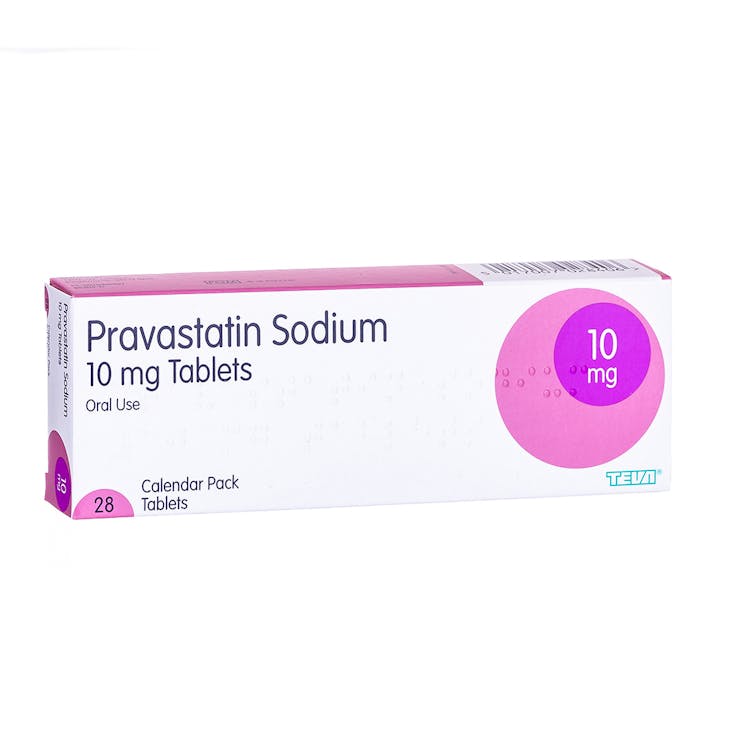- Home
- Enfermedades Crónicas
- Colesterol Alto
- Pravastatin
Pravastatin
Imágenes únicamente para fines ilustrativo
Pravastatin is a medication taken to lower high cholesterol. It belongs to a group of medications known as statins. It can also be prescribed to prevent heart disease in some people.
- Prevents cholesterol from building up
- Reduces the amount produced
- Decreases risk of future health complications
- Genuine medication
- Shipped from EU Pharmacies
Más información
About Pravastatin
- Pravastatin belongs to a group of medications called statins
- Pravastatin helps to lower levels of cholesterol in the blood
- In people who are in a high risk category, pravastatin is also prescribed to help prevent other conditions including heart attacks and strokes
- Pravastatin usually only needs to be taken once a day
- It is important to read the patient leaflet for a full list of side effects and cautions.
How Does Pravastatin Work?
Cholesterol is a fatty substance. Pravastatin works by reducing the amount of cholesterol that is produced and retained within the body’s blood vessels.
Reducing the amount of cholesterol produced helps to prevent cholesterol from building up in the walls of the arteries. This is important because having cholesterol in the arteries increases the risk of the arteries becoming blocked. When arteries become blocked, it can result in a stroke, heart attack, or damage to another organ in the body such as the kidneys.
Pravastatin can therefore reduce the risk of high cholesterol, and some of its complications.
Some people will be prescribed pravastatin after a heart attack, or if they are diagnosed with angina. Pravastatin can also be prescribed to patients following an organ transplant.
How is Pravastatin Taken?
Pravastatin should be taken in conjunction with a low fat diet.
The tablet is usually taken once a day in the evening with or without food. Pravastatin should be swallowed whole with some water. Taking the tablet with food may help to reduce the risk of digestive side effects occurring.
Dosage of Pravastatin
Pravastatin tablets are available in three doses, 10mg, 20mg and 40mg.
Your dose may range from 10mg to 40mg daily depending on how high your cholesterol level is. The dose will also vary based on whether pravastatin is being used to prevent cardiovascular complications, or if cardiovascular disease is already present.
Patients with liver or kidney disease may be prescribed the lower dose of 10mg initially.
Are there any Side Effects?
Like all medications, pravastatin can have some side effects. Side effects occur uncommonly but include:
- Dizziness
- Headache
- Sleep disturbance or insomnia
- Blurred vision
- Abdominal pain
- Nausea and vomiting (feeling sick and being sick)
- Constipation
- Diarrhoea
- Itching or a skin rash
- Painful or frequent urination
- Tiredness.
These side effects are likely to settle down, but if they persist or become troublesome you should speak to your doctor for further advice.
Rarely, more serious side effects can occur. These include:
- Muscle pain and weakness – this could be a sign of muscle or kidney damage
- Yellowing of the skin or whites of the eyes, with dark urine (pee) or pale stools (poo) – this could be a sign of liver problems
- Cough and breathlessness – this could be a sign of a lung problem
- Skin rashes on the palms of the hands or soles of the feet
- Severe abdominal (tummy) pain – this could be a sign of a problem with the pancreas.
If you are worried about any of the above symptoms, you should speak to a doctor straight away.
Serious allergic reactions happen very rarely. If you have a severe allergic reaction (anaphylaxis) including breathlessness, lip swelling or tongue swelling, call 999 immediately.
Pravastatin Warnings
Pravastatin may not be suitable for everyone. You should tell your prescriber if you:
- Have an allergy to pravastatin or any ingredient in the tablet
- Have liver disease
- Have kidney disease
- Have an underactive thyroid
- Have diabetes
- Are aged 65 or older
- Are pregnant, trying to conceive, or breastfeeding.
Your prescriber can then advise whether pravastatin is a suitable medication for you.
Some medications can interact with pravastatin. You may be advised that pravastatin will not suit you if you already take:
- Oral fusidic acid
- Fibrates including gemfibrozil or fenofibrate
- Colestyramine or colestipol
- Ciclosporin
- Anticoagulants including warfarin
- Antibiotics including erythromycin or clarithromycin
- Colchicine
- Nicotinic acid or niacin
- Rifampicin
- Lenalidomide.
Because pravastatin may not suit everyone, we will complete a Consultation with you including a health questionnaire. This will ensure that the medication will be suitable for you.
A qualified prescriber will review your current medications, including any herbal remedies or supplements, to ensure that pravastatin will not interact with them.
Once prescribed, pravastatin will be ordered on your behalf via electronic prescription. Pravastatin will then be conveniently dispatched from one of our partner pharmacies.
Buy Pravastatin
Buying Pravastatin Online
Can I buy Pravastatin online?
You can safely buy Pravastatin online at EU Meds. You will first need to have an online consultation with a pharmacist independent prescriber before your order will be supplied. The online consultation will ensure that Pravastatin is the right medication for your medical condition.
Do I need a prescription for Pravastatin?
Yes, in order to purchase Pravastatin you will need a valid prescription. Please note, all requests for supply of prescription medications are subject to an online clinical consultation and the decision to prescribe will be made by a doctor.

Aquí para ayudarte
Our Customer Service is available Monday to Friday 9am - 4pm. If you need urgent assistance, do not use this service. Call 111, or in an emergency call 999. Visit our help section



